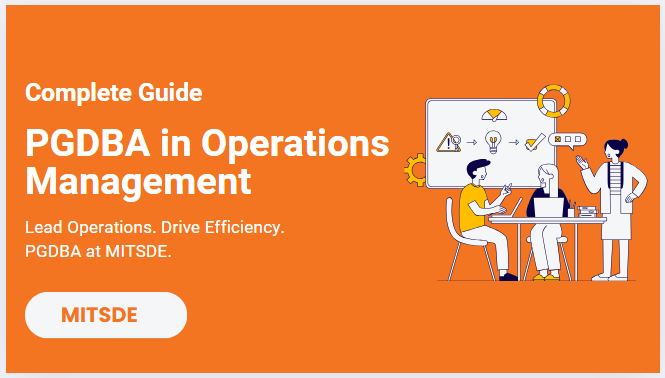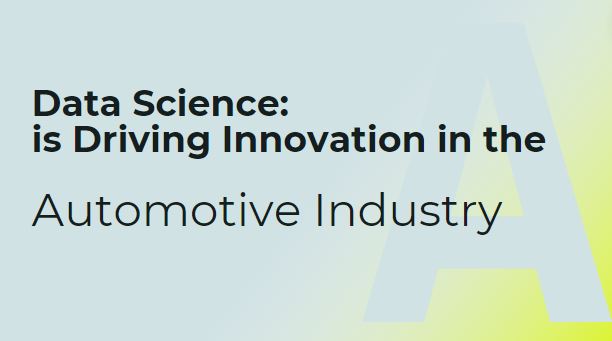
In a world where organizations strive for agility, cost-effectiveness, and process excellence, operations management stands as the backbone of business success. The ability to streamline production, manage supply chains, reduce costs, and enhance productivity has become indispensable. This is where a PGDBA in Operations Management plays a transformative role.
Among the various institutions offering specialized programs in this field, the MIT School of Distance Education (MITSDE) stands out with its robust curriculum, industry-relevant pedagogy, and learner-centric approach. This blog will walk you through a complete overview of the PGDBA Operations Management curriculum, its structure, benefits, and how it shapes career-ready professionals.
Why Pursue a PGDBA in Operations Management?
Operations Management isn’t just about manufacturing—it encompasses logistics, procurement, inventory control, production planning, quality management, and more. With the rise of e-commerce, global supply chains, and digitized workflows, operations professionals are in high demand.
A PGDBA in Operations Management equips you with the analytical, strategic, and technical skills necessary to manage business operations efficiently. Whether you’re a recent graduate or a working professional looking to pivot into a management role, this course can be your gateway to impactful opportunities.
MITSDE’s PGDBA Operations Management Program Guide
MIT School of Distance Education offers a two-year Post Graduate Diploma in Business Administration (PGDBA) in Operations Management, meticulously structured to balance theoretical knowledge with real-world applicability.
 Program Highlights:
Program Highlights:
- Duration: 2 years (4 semesters)
- Mode: Fully online with live lectures, recorded sessions, and e-learning resources
- Eligibility: Graduate in any discipline
- Fee: ₹95,000 (subject to changes)
- Tools & Techniques Covered: ERP, CRM, Lean, Six Sigma, World-Class Manufacturing, Business Analytics
PGDBA Operations Management Curriculum Overview
Let’s break down the PGDBA curriculum semester-wise to better understand how it builds your competencies progressively.
 Semester I: Foundation in Business Administration
Semester I: Foundation in Business Administration
This semester introduces the basics of business functions and managerial frameworks. It’s designed to help students grasp the fundamentals of management before diving into specialization.
Subjects:
- Principles of Management: Understand managerial roles, leadership styles, and decision-making frameworks.
- Indian Economy and Policy: Examine macro and microeconomic principles affecting operations and business policy.
- Business Communication: Learn effective communication techniques for internal and external stakeholders.
- Accounting for Managers: Get hands-on with financial statements, cost accounting, and budgeting.
- Marketing Management: Study market segmentation, consumer behavior, and the marketing mix.
- Legal and Business Environment: Understand labor laws, business laws, and regulatory frameworks.

 Semester II: Strategic and Analytical Skills
Semester II: Strategic and Analytical Skills
This semester equips learners with analytical tools and managerial strategies to support operations-focused decisions.
Subjects:
- Management Information Systems: Learn how data systems support strategic decision-making.
- Human Resource Management: Explore HR functions from recruitment to employee engagement.
- Research Methodology & Decision-Making: Develop problem-solving frameworks using qualitative and quantitative methods.
- Strategic Management: Study business strategy, growth models, and competitive analysis.
- Business Analytics: Gain insights into data-driven decision-making using analytical models.
- Financial Management: Understand capital budgeting, financial planning, and investment strategies.

 Semester III: Core Operations Specialization
Semester III: Core Operations Specialization
Here, you deep-dive into the operations management discipline, exploring tools, processes, and technologies that optimize productivity.
Subjects:
- Business Ethics & CSR: Learn ethical leadership and social responsibility frameworks.
- Production, Planning & Control: Study methods to schedule, monitor, and optimize production cycles.
- Operations Management: Explore operational strategy, process optimization, and quality frameworks.
- Lean Management Systems: Understand how to eliminate waste and enhance value in operations.
- Project Management: Develop competencies in initiating, planning, and executing business projects.
- Project Work: Apply knowledge through practical project assignments.
- Elective (Choose One):
- HR Analytics
- Marketing Analytics
- Financial Analytics
- Supply Chain Analytics

 Semester IV: Advanced Operations and Entrepreneurship
Semester IV: Advanced Operations and Entrepreneurship
This final semester focuses on advanced practices, innovations in manufacturing, and entrepreneurial capabilities.
Subjects:
- Entrepreneurship and Venture Capital Management: Learn how to build and finance your own venture.
- World-Class Manufacturing: Study global best practices in manufacturing excellence.
- Achieving Supply Chain Integration: Understand supply chain coordination and collaboration.
- Operations Research: Learn optimization and decision analysis techniques.
- Project Work: Final capstone project to showcase real-world problem-solving.
- Elective (Choose One):
- Social Media Marketing
- Predictive Modeling
- Marketing of Financial Services

Skillsets You Develop
By the end of this program, you’ll gain the following skills:
- Operational efficiency and quality control
- Supply chain optimization
- ERP/CRM software application
- Lean and Six Sigma practices
- Project and resource management
- Business process re-engineering
- Strategic decision-making
- Data analytics and reporting
Career Paths After PGDBA in Operations Management
The comprehensive PGDBA Operations Management curriculum opens up multiple career avenues. Industries from manufacturing and e-commerce to healthcare and logistics require skilled operations professionals.
 Top Job Roles:
Top Job Roles:
- Operations Manager
- Project Manager
- Supply Chain Manager
- Production Planner
- Procurement Manager
- Logistics Manager
- Quality Assurance Manager
- Inventory Control Analyst
- ERP Consultant
- Operations Analyst
Many graduates also choose to pursue careers in consulting or entrepreneurship.
Salary Potential
The salary post-completion of a PGDBA varies based on experience, company size, and location. Here’s an estimate:
Role | Average Annual Salary (INR) |
Operations Manager | ₹6–20 LPA |
Supply Chain Manager | ₹8–25 LPA |
Logistics Manager | ₹5–18 LPA |
Quality Assurance Manager | ₹7–20 LPA |
Project Manager | ₹7–25 LPA |
Consultant | ₹8–30 LPA |
Who Should Enroll?
This program is ideal for:
- Fresh graduates aspiring to enter the operations field
- Engineers and technical professionals looking to move into managerial roles
- Mid-level managers seeking promotion or role enhancement
- Entrepreneurs wanting to streamline their production and operations
Why Choose MITSDE?
Here’s what sets MITSDE apart in delivering a standout PGDBA in Operations Management:
Flexible Learning: Access recorded sessions anytime, anywhere.
Experienced Faculty: Learn from industry veterans and academic experts.
Updated Curriculum: Designed in collaboration with industry leaders.
Real-World Exposure: Practical projects and case studies.
Career Support: Resume building, interview prep, and placement assistance.
Final Thoughts
The PGDBA in Operations Management from MITSDE is a future-forward program that combines foundational business knowledge with deep operational expertise. From production planning to supply chain integration and project execution, the curriculum prepares you to lead operations across diverse industries.
Whether you’re aiming for upward mobility in your current job or seeking to transition into operations, this program can help you reach your goals.


